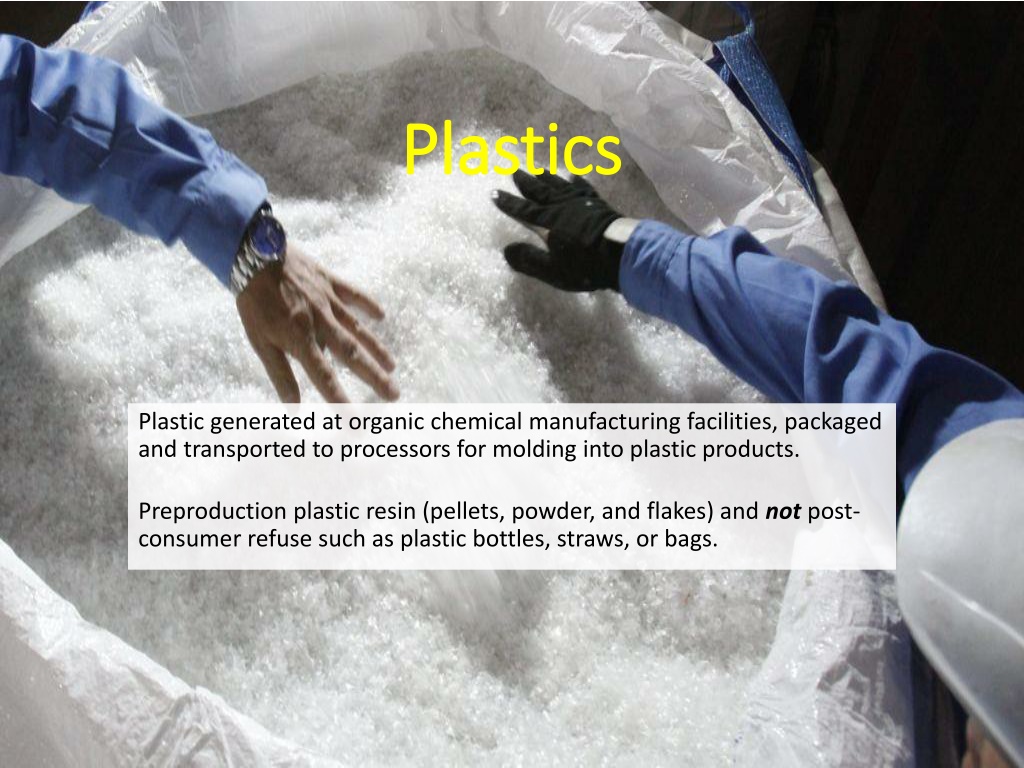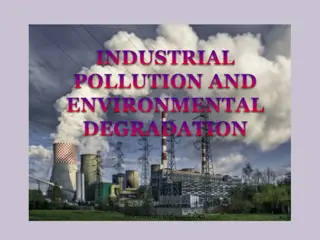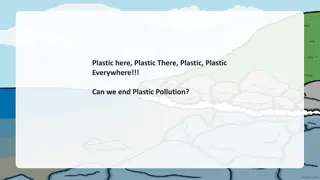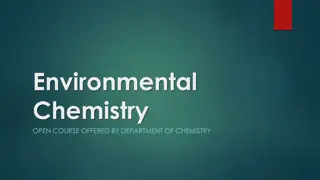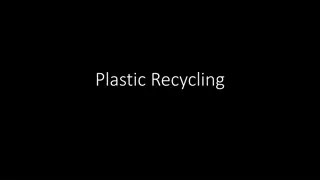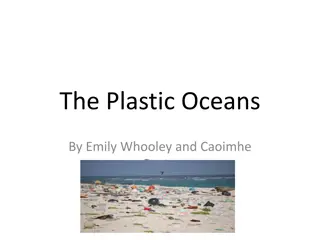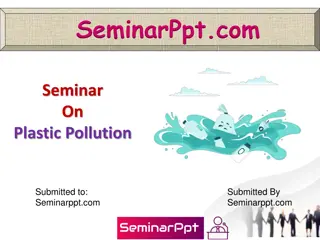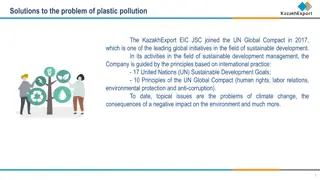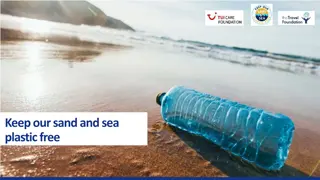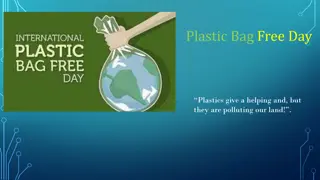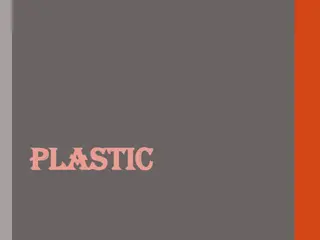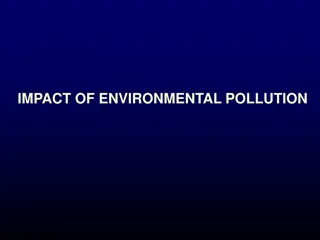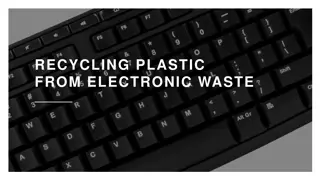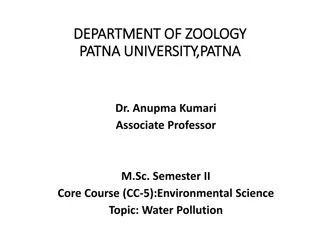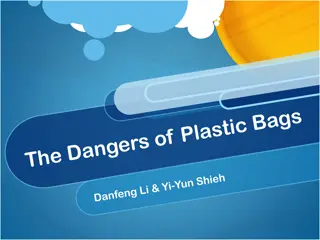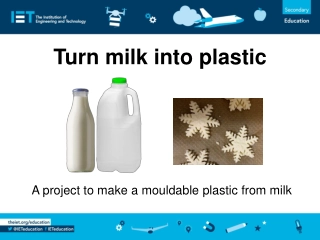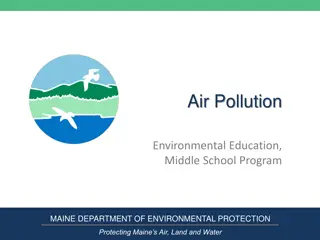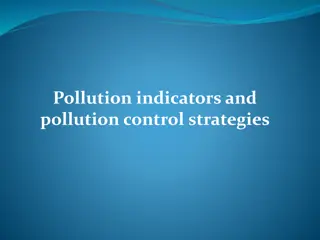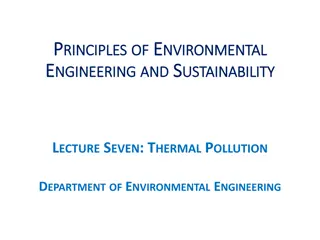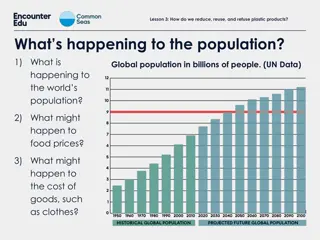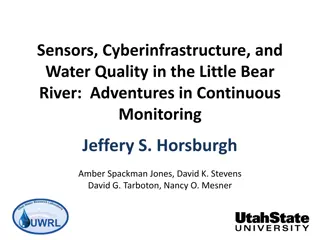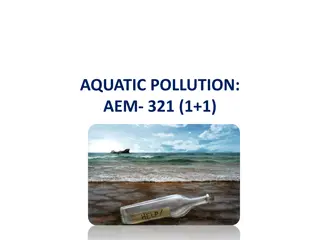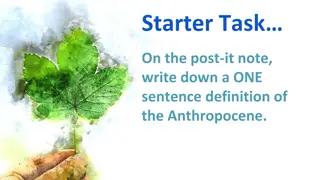Understanding Plastic Pollution and Water Quality Impacts
Plastic pollution from manufacturing facilities and improper disposal practices has detrimental effects on water quality and aquatic life. Plastics not only harm aquatic species but also disrupt habitats and ecosystems. Initiatives such as plastic prohibition and best management practices are essential to curb plastic pollution and protect water quality.
Download Presentation

Please find below an Image/Link to download the presentation.
The content on the website is provided AS IS for your information and personal use only. It may not be sold, licensed, or shared on other websites without obtaining consent from the author. Download presentation by click this link. If you encounter any issues during the download, it is possible that the publisher has removed the file from their server.
E N D
Presentation Transcript
Plastics Plastics Plastic generated at organic chemical manufacturing facilities, packaged and transported to processors for molding into plastic products. Preproduction plastic resin (pellets, powder, and flakes) and not post- consumer refuse such as plastic bottles, straws, or bags.
Water Quality Water Quality Impacts Impacts Physical impacts to aquatic species abrasive injuries, clogging gills and respiratory passages, and obstructing the digestive system Impacts to aquatic habitat and ecosystems- Suspended plastics increase the turbidity of the water, reduce light penetration, and impair the photosynthetic activity of aquatic plants Settleable plastics degrade benthic organism habitat Plastic pollution reduces the recreational use and aesthetic value
Plastics Prohibition Plastics Prohibition There are approximately 155 plastic pellet manufacturers and molders/formers with individual TPDES permits TPDES permits do not authorize any amount of plastic pellets to be discharged into receiving waters TCEQ Actions To Clarify Prohibition: update the Industrial Wastewater Permit Application (TCEQ- 10055); update 30 TAC Chapter 307 to explicitly prohibit the discharge of plastics; and update individual permits and the Multi-Sector General Permit to clarify prohibition of the discharge of plastics and require BMPs Investigator Guidance for consistency across TCEQ Regions
Plastics Plastics - - Definitions Definitions TCEQ requesting stakeholder input on the appropriate terms and definitions Example: Plastics means all forms of visible plastic produced, received or handled at the permittee s facility, including but not limited to: pellets, powder and flakes. Plastics - Microplastics - Plastic Materials - Preproduction Plastics Pellets: Polypropylene, PVC, HDPE Powder, Flakes, Fluff, etc.
Plastics Plastics Best Management Practices Management Practices Best SWP3 activities implemented to ensure that areas of the facility that can contribute plastic pollutants to stormwater discharges are maintained. Good housekeeping measures must prevent exposure of plastics and other plastic pre-production materials to precipitation or runoff prior to their use in further processing or disposal. Facilities that handle pre-production plastic must implement BMPs to eliminate discharges of plastic in stormwater through the implementation of control measures such as the following, where determined feasible: minimizing spills, cleaning up spills promptly and thoroughly, sweeping thoroughly, and pellet capturing.
Plastics Plastics Other Requirements Requirements Other Outfall and receiving water inspection Notification of spills and unauthorized discharges to Regional Office Recovery of released materials from receiving waters
Plastics Plastics Other Requirements Requirements Other Clarification that the point of compliance for the prohibition on the discharge of plastics is the final outfall. If the discharge enters a water in the State prior to exiting the property, the point of compliance must be located prior to entering a water in the State. Treatment units such as settling ponds are not considered water in the State.
Plastics Plastics Compliance Period Compliance Period TCEQ is requesting stakeholder input regarding additional time to comply with a no discharge requirement. TSWQS allow up to a three-year compliance period. Request must justify the need for additional time including a construction schedule to install new control structures or retrofitting existing systems to achieve compliance. If approved, the compliance period will include submission of quarterly progress reports. TCEQ may reopen permits during the current permit term to include additional requirements under the staff-initiated minor amendment process.
